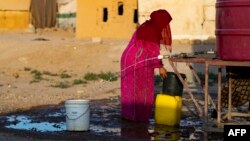A plane carrying medical supplies to deal with the spread of a deadly cholera outbreak in war-torn Syria landed in the capital of Damascus on Monday, the World Health Organization said, and another one will follow.
Ahmed Al-Mandhari, WHO's regional director, told The Associated Press in an interview during a visit to Damascus that Syrian health authorities are coordinating with the international organization to contain the outbreak.
“It is a threat to Syria, to the region, (to) neighboring countries and to the whole world,” he said.
Al-Mandhari's comments came days after health officials in Syria reported at least five deaths and about 200 cases in different provinces. It is the first such outbreak since before the conflict began in March 2011.
The U.N. and Syria’s Health Ministry have said the source of the outbreak is believed to be linked to people drinking unsafe water from the Euphrates River and using contaminated water to irrigate crops, resulting in food contamination.
The cases were reported in several provinces, including Aleppo in the north, Latakia on the Mediterranean coast and Deir el-Zour along the border with Iraq.
Al-Mandhari said the WHO is working on strengthening surveillance to identify cases and give the sick the proper treatment as well as trace those who are infected and those who were in contact with them.
He said an airplane supported by the WHO carrying around 30 tons of supplies to support health authorities to deal with the crisis landed in Syria Monday. Al-Mandhari said the supplies will be equally distributed depending on needs including in areas in the rebel-held northwest and northeast controlled by U.S.-backed Kurdish-led fighters.
He said another plane was scheduled to arrive Wednesday with a similar load of supplies.
The outbreak comes at a time when Syria’s medical sector has been badly damaged over the past 11 years in a conflict that killed hundreds of thousands of people, wounded over 1 million more and displaced half the country’s prewar population.
Al-Mandhari said 55% of health care facilities are not functioning in Syria and about 30% of hospitals sometimes do not function because of a “lack of electricity, which pushes them to use generators, which is not sustainable.”
He added that many Syrian health workers have left the country over the years, leading to a lack of staff to run different services.
“The health situation in Syria is really very difficult. It is very challenging,” Al-Mandhari said.
Separately, Al-Mandhari said around 15% of Syria's population has received a single dose of COVID-19 vaccine, or about 2.5 million people.
“It is really low compared with our targets which is supposed to reach 40% by the end of June and 70% by the end of the year." He said 13% of Syria’s residents have received two doses.




